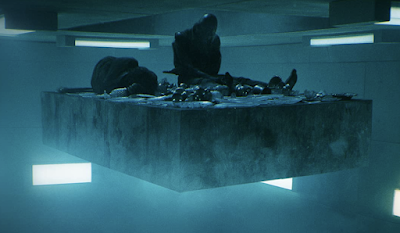Although this is a fictional movie, and one that also has some visceral nastiness in a number of scenes, The Platform is just about the best analogy for the current state of most modern societies that I can think of. The commentary is as unsubtle as can be, the messaging couldn't be any clearer, and yet I feel saddened by the fact that some will still be able to watch it and think of it as something completely fantastical and removed from reality.
Iván Massagué plays Goreng, a young man who wakes up in a concrete cell across from a man named Trimagasi (Zorion Eguileor). Their cell is on level 48 of a construction seems to feature cells atop one another for a difficult-to-determine number of levels. Every so often, a platform comes into their cell, and that platform is covered in food. Those nearer the top of the structure, and 48 isn't too bad, can fill their bellies, although the platform may also be covered with leftovers from those above, and more conscientious prisoners may try to leave enough food to be rationed out properly to those further below them. Goreng is quite the conscientious soul, but he cannot seem to win over anyone else to the idea of properly rationing out the food and trying to even the playing field for everyone.
Written by David Desola and Pedro Rivero, The Platform is variously disheartening, disappointing (as people act in the way you expect them to), and disgusting. It takes a very short amount of time to realise that what we're being shown onscreen is a microcosm of our own world, a world in which we keep getting told about trickle-down economics while we feel warm urine running down our backs as the 1% pee on us from up on their golden pedestals. Finding out that Goreng volunteered for his imprisonment, which is shown quite early on, re-enforces the depressing parallel with everyday life (because we put ourselves at the mercy of others so often in the hope that it leads to the smallest upgrade in our social standing and/or fortunes), and it's that kind of detail that shows how keen Desola and Rivero were to hit viewers with a sledgehammer of social commentary.
Director Galder Gaztelu-Urrutia does a good job, providing enough visual tricks to distract from the fact that the majority of the film requires very few variations in the set design and very few main performers onscreen. The strength of the film lies within how it presents the ideas at the heart of it, and Gaztelu-Urrutia doesn't try to do much that detracts from that core.
Similarly, the cast all do well, but no one person feels any more important than their part in helping to paint a grim picture. Massagué is a fine lead, but in a situation so bleak that viewers are prepared for his journey to end in any number of different ways, and Eguileor provides a good (a)moral counterpoint to the early scenes. Antonia San Juan and Emilio Buale play a couple of other prisoners, either of whom may prove to be a help or hindrance to Massagué's character, and Alexandra Masangkay brings a bit of extra chaos to the proceedings, playing a prisoner named Miharu who is apparently searching for a lost child.
There's more than a hint of Cube to this, and some inevitable similarities to High-Rise, but it keeps trying to do a bit more than either of those. Unfortunately, the lack of subtlety works against it as much as it works for it. I liked this, I was aggravated by it, and I was wishing that the writers could have figured out a way to develop their ideas with a lighter touch. Maybe that wouldn't have been possible though, and kudos to the film-makers for making such good use of their own platform.
6/10
If you have enjoyed this, or any other, review on the blog then do consider the following ways to show your appreciation. A subscription/follow costs nothing.
It also costs nothing to like/subscribe to the YouTube channel attached to the podcast I am part of - https://www.youtube.com/channel/UCErkxBO0xds5qd_rhjFgDmA
Or you may have a couple of quid to throw at me, in Ko-fi form - https://ko-fi.com/kevinmatthews

No comments:
Post a Comment